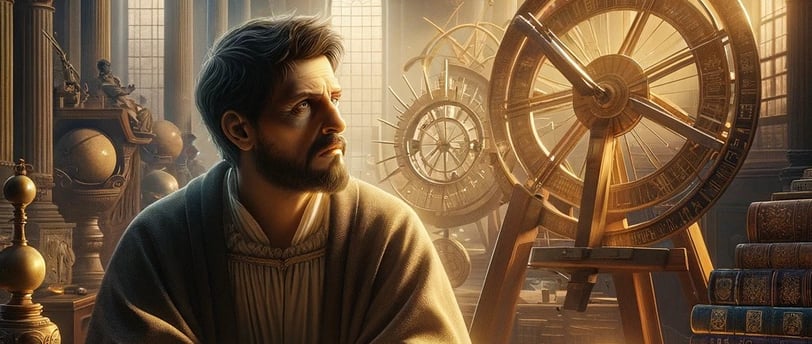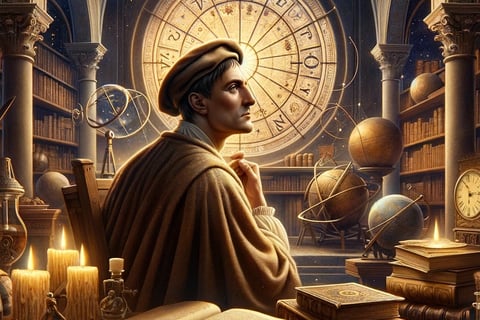Giordano Bruno
A Visionary in a Time of Ignorance
STORIES


In the heart of the Renaissance, amidst an era dominated by religious dogmatism, stood a figure who dared to envision the cosmos in a way that defied the narrow perspectives of his time. This figure was Giordano Bruno, a philosopher, cosmologist, and visionary, who speculated about the existence of alien life and a universe much larger than anyone could fathom in the 1500s.
The Rebel of the Renaissance: Giordano Bruno
Born in 1548 in Nola, in the Kingdom of Naples, Giordano Bruno was not just a philosopher but a pioneer who ventured into territories that were forbidden and uncharted. His ideas were revolutionary, proposing that stars were distant suns surrounded by their planets, potentially harboring life – a concept known as cosmic pluralism.
The Limited Medieval Cosmos
In contrast to Bruno's expansive view, the medieval cosmos was a confined concept, shaped by the works of Aristotle and Ptolemy, mixed with Christian elements. It regressed to a geocentric model, with the Earth erroneously believed to be at the universe's center. This backward thinking resulted in a scientific dark age, where the church brutally persecuted those who dared to challenge its doctrines.
Bruno's Unwavering Conviction
Unlike Galileo, who recanted his discoveries to save his life, Bruno remained steadfast in his beliefs. His crime? Proposing that planets other than Earth could harbor life. This stance led to his prosecution for heresy by the Roman Inquisition, culminating in his execution by burning in 1600.
Bruno’s Revolutionary Ideas
Bruno's ideas were not just limited to cosmology. He also wrote extensively on the art of memory, developing a set of mnemonic techniques and principles. He was heavily influenced by Renaissance Hermeticism, drawing inspiration from Hermes Trismegistus, a legendary esoteric teacher.
Journey Across Europe
Bruno's journey took him across Europe, from Geneva to Paris, and then to England. In England, he joined the Hermetic circle of London, where he completed several of his significant works. His stay in England was particularly fruitful, leading to the completion of "De l'infinito universo et mondi" (On the Infinite Universe and Worlds), his most groundbreaking work.
The Inquisition and Bruno’s Martyrdom
Bruno's bold ideas eventually caught the attention of the Inquisition. His belief in the transmigration of souls and pantheism, where he saw the universe itself as a divine entity, was particularly controversial. Despite the dangers, he continued to propagate his revolutionary views, ultimately leading to his tragic fate at the hands of the church.
Legacy and Influence
Bruno’s death was not in vain; his ideas lived on, inspiring generations of thinkers and scientists. His views on the infinite universe and the existence of multiple worlds laid the foundation for modern cosmology. He was a true polymath, contributing to fields beyond astronomy, including mnemonics and qualitative mathematics.
Giordano Bruno remains a symbol of intellectual courage and freedom. In an age where the church's grasp stifled scientific progress, Bruno’s visions of an infinite universe and extraterrestrial life stood as a beacon of progress and free thought. His legacy challenges us to think beyond the confines of our time and to pursue knowledge, no matter the opposition. Bruno’s life and work remind us of the importance of keeping the flame of curiosity and exploration alive in a world often resistant to change.



